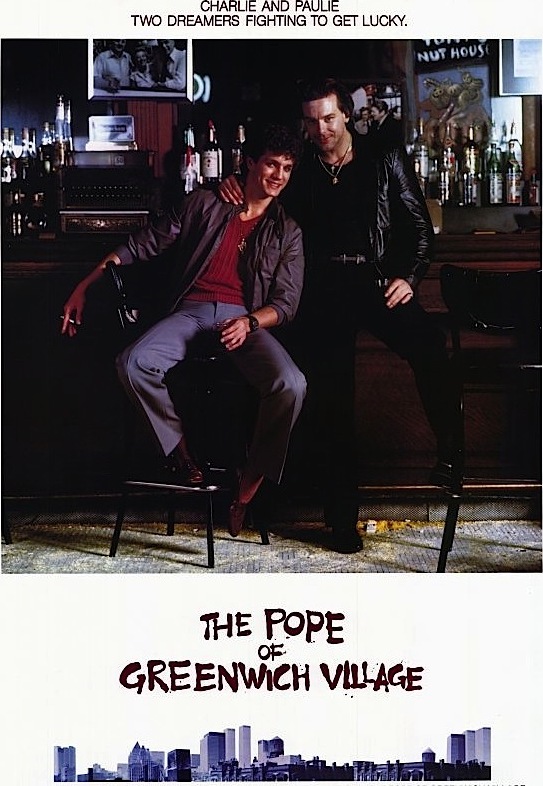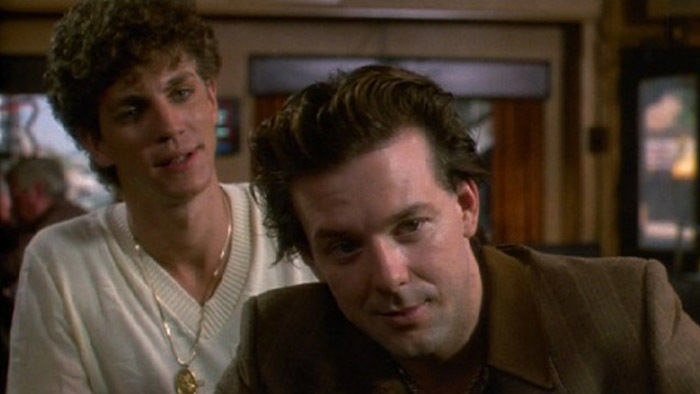The Petrified Forest (1936)
Director: Archie Mayo
An interesting old gangster flick with an novel arc and a few thoughtfully-crafted characters, but one which suffered from the trappings of many of its contemporaries.
The story begins with a drifter wandering through the Arizona desert and happening upon an isolated gas station. The drifter, Alan (Leslie Howard), is an Englishman who has left behind a life of ease and luxury in order to find something profound in the expanse of the American Southwest. At the gas station, he finds Gaby (Bette Davis), the daughter of the station manager and a young woman who seeks to escape the desolation and confinement of the family business. Alan and Gaby quickly find somewhat kindred spirits in each other, and a spark of passion is ignited. While the older Alan eventually leaves Gaby, things are thrown into chaos when a fugutive criminal, Duke Mantee (Humphrey Bogart), arrives in the area with his small crew of bank robbers and killers on the run. Once they take over the gas station and the threat of death becomes palpable, the tone becomes rather existential for several of the captives.
The main story is very solid, and the primary characters are deep enough to be compelling through their interactions. However, the execution is heavily rooted in standard screenwriting of the time. The dialogue can be a bit cliche, especially with the gangsters. A bigger problem for me, though, is the pacing, which seemed very rushed, making the plot points feel more forced and quite implausible. When we consider that the setting is the middle of nowhere, it becomes ridiculous to think that a lone drifter, a quartet of fugitive thugs, and a wealthy couple and their driver all end up at the same spot at the same time. In fact, the wealthy couple hardly seemed essential to the true heart of the plot, and I felt that the movie could have been stronger without them. The movie had a very similar feeling to another Bogart movie - Key Largo - which bore several of the same strengths and weaknesses. Both movies also had the feel of a tale meant for the stage rather than the silver screen (as they both were).
Fortunuately, The Petrified Forest clocks in at a very modest 82 minutes, making it an easy watch. Because of its brevity, it is well worth watching for fans of old-time gangster movies or just Humphrey Bogart. This was an earlier, non-starring role for Bogie, but he could pull off a rather menacing bad guy just as well as anybody ever has.
The Pope of Greenwich Village (1984)
Director: Stuart Rosenberg
I realize that this movie is highly admired by plenty of people, both casual movie-viewers and a fair number of critics. And while it has some clear merit, it really didn't come very close to living up to its reputation for me.
The tale follows Charlie (Mickey Rourke) and his cousin Paulie (Eric Roberts), a pair of local Italian-American boys in Greenwich Village, New York City. Both work in a restaurant but aspire to greater wealth, and neither is above illegal means to obtain it. Their approaches towards life could hardly be more different, though. Charlie, while not exactly a master criminal or life winner, at least has some style and a sense of patience and propriety. Paulie, though, is a complete mess of a human being. Painfully loud and boorishly obnoxious, he can hardly sit still for a second without trying to con someone or get some kind of get-rich-quick scheme underway. His latest is to rob a safe which houses tens of thousands of dollars. He ropes in Charlie and a neighborhood safe-cracker to pull off the job, hoping to split the take. Running along with this scam is Paulie's ill-advised investment in a racehorse.
There are the makings of a good crime tale in the movie. There is a somewhat suspenseful little heist that goes wrong. There are several looming mafiosi. There is the dynamic between the woefully immature Paulie and the less-immature Charlie as they try to navigate some extremely treacherous waters. Still, the movie came off as a patchwork of sometimes-compelling scenes rather than a cohesive whole that had anything particularly interesting to say. While there is some character study involved, it ultimately feels downplayed by the time the final credits roll.
It also not hard to see why many people have found the movie entertaining. Not unlike The Godfather before it and Goodfellas after, The Pope of Greenwich village gives us more than few amusing verbal exchanges of the distinctly New York Italian-American variety. Plenty of balls are busted and many hands are waved around as the several none-too-bright characters baffle each other with their ineptitude. For those moments, the movie can be fun.
As he did so many times with other movies, Roger Ebert articulated what I felt about this movie far better than I could. He generally liked the movie, but he felt that it was far more about the performances than about any story or message. It is what he dubbed a "Behavior Movie". When I read this, I realized just how right he was. I also realized that, despite many strong performances, I was disappointed in this movie, and I feel no need to see it again.
Director: Archie Mayo
An interesting old gangster flick with an novel arc and a few thoughtfully-crafted characters, but one which suffered from the trappings of many of its contemporaries.
The story begins with a drifter wandering through the Arizona desert and happening upon an isolated gas station. The drifter, Alan (Leslie Howard), is an Englishman who has left behind a life of ease and luxury in order to find something profound in the expanse of the American Southwest. At the gas station, he finds Gaby (Bette Davis), the daughter of the station manager and a young woman who seeks to escape the desolation and confinement of the family business. Alan and Gaby quickly find somewhat kindred spirits in each other, and a spark of passion is ignited. While the older Alan eventually leaves Gaby, things are thrown into chaos when a fugutive criminal, Duke Mantee (Humphrey Bogart), arrives in the area with his small crew of bank robbers and killers on the run. Once they take over the gas station and the threat of death becomes palpable, the tone becomes rather existential for several of the captives.
The main story is very solid, and the primary characters are deep enough to be compelling through their interactions. However, the execution is heavily rooted in standard screenwriting of the time. The dialogue can be a bit cliche, especially with the gangsters. A bigger problem for me, though, is the pacing, which seemed very rushed, making the plot points feel more forced and quite implausible. When we consider that the setting is the middle of nowhere, it becomes ridiculous to think that a lone drifter, a quartet of fugitive thugs, and a wealthy couple and their driver all end up at the same spot at the same time. In fact, the wealthy couple hardly seemed essential to the true heart of the plot, and I felt that the movie could have been stronger without them. The movie had a very similar feeling to another Bogart movie - Key Largo - which bore several of the same strengths and weaknesses. Both movies also had the feel of a tale meant for the stage rather than the silver screen (as they both were).
Fortunuately, The Petrified Forest clocks in at a very modest 82 minutes, making it an easy watch. Because of its brevity, it is well worth watching for fans of old-time gangster movies or just Humphrey Bogart. This was an earlier, non-starring role for Bogie, but he could pull off a rather menacing bad guy just as well as anybody ever has.
The Pope of Greenwich Village (1984)
Director: Stuart Rosenberg
I realize that this movie is highly admired by plenty of people, both casual movie-viewers and a fair number of critics. And while it has some clear merit, it really didn't come very close to living up to its reputation for me.
The tale follows Charlie (Mickey Rourke) and his cousin Paulie (Eric Roberts), a pair of local Italian-American boys in Greenwich Village, New York City. Both work in a restaurant but aspire to greater wealth, and neither is above illegal means to obtain it. Their approaches towards life could hardly be more different, though. Charlie, while not exactly a master criminal or life winner, at least has some style and a sense of patience and propriety. Paulie, though, is a complete mess of a human being. Painfully loud and boorishly obnoxious, he can hardly sit still for a second without trying to con someone or get some kind of get-rich-quick scheme underway. His latest is to rob a safe which houses tens of thousands of dollars. He ropes in Charlie and a neighborhood safe-cracker to pull off the job, hoping to split the take. Running along with this scam is Paulie's ill-advised investment in a racehorse.
There are the makings of a good crime tale in the movie. There is a somewhat suspenseful little heist that goes wrong. There are several looming mafiosi. There is the dynamic between the woefully immature Paulie and the less-immature Charlie as they try to navigate some extremely treacherous waters. Still, the movie came off as a patchwork of sometimes-compelling scenes rather than a cohesive whole that had anything particularly interesting to say. While there is some character study involved, it ultimately feels downplayed by the time the final credits roll.
It also not hard to see why many people have found the movie entertaining. Not unlike The Godfather before it and Goodfellas after, The Pope of Greenwich village gives us more than few amusing verbal exchanges of the distinctly New York Italian-American variety. Plenty of balls are busted and many hands are waved around as the several none-too-bright characters baffle each other with their ineptitude. For those moments, the movie can be fun.
As he did so many times with other movies, Roger Ebert articulated what I felt about this movie far better than I could. He generally liked the movie, but he felt that it was far more about the performances than about any story or message. It is what he dubbed a "Behavior Movie". When I read this, I realized just how right he was. I also realized that, despite many strong performances, I was disappointed in this movie, and I feel no need to see it again.



No comments:
Post a Comment